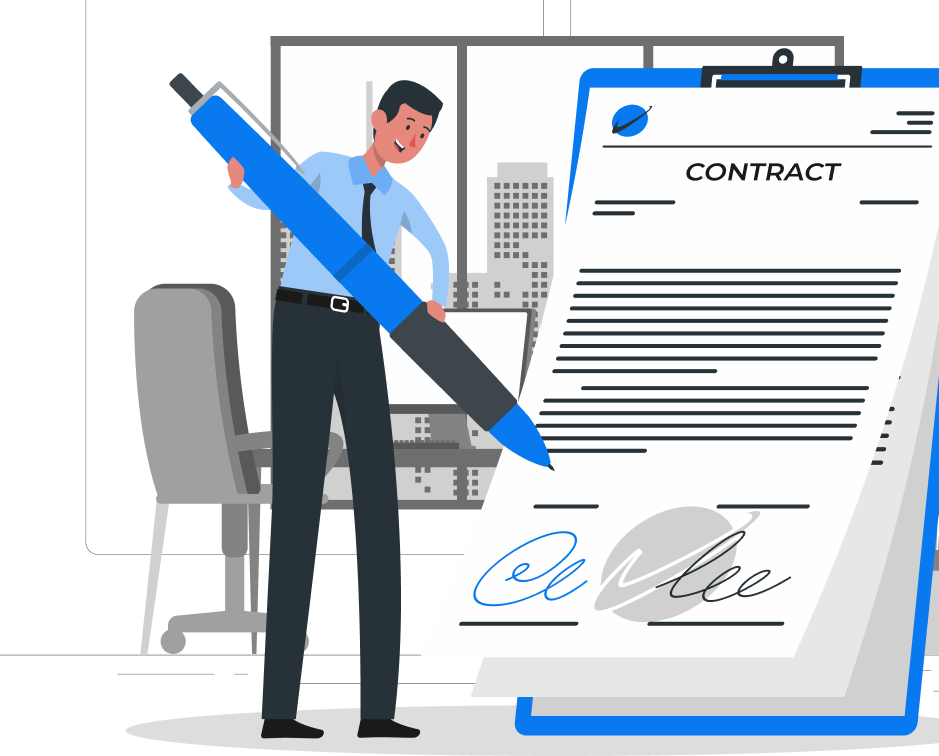Non-compete clauses are like rules between bosses and workers. They stop workers from working for a rival company after they leave their jobs. They’re important in businesses where workers know secret stuff, like client names or special tricks.
These rules help businesses keep their secrets safe and stay ahead of the competition. But they also need to be fair to workers, so they can still find new jobs. Knowing about these rules is important for both bosses and workers. Bosses need to make sure the rules are fair and will actually work. Workers need to understand what they can and can’t do after they leave a job.
Understanding Non-Compete Clauses

Non-compete clauses, upheld in most states under employment law, restrict former employees from engaging in businesses that compete with their previous employer. These clauses, designed to protect trade secrets and proprietary information, must be reasonable in scope, duration, and geographical area to be enforceable.
By preventing unfair competition and safeguarding an employer’s business interests, non-compete clauses play a crucial role in ensuring the integrity of intellectual property and confidential information within the business realm.
Definition and Purpose of Non-compete Agreement
A non-compete clause is like a rule in a contract that stops an employee from working for a rival company or starting their own similar business while they’re working for a particular employer or after they leave. It’s there to keep the employer’s secrets safe, like special info about customers or how things are done.
These rules are usually part of the job contract or a separate agreement that employees have to sign. They say that employees can’t do things that compete with their employer’s business, like working for a rival, in a certain area or industry, for a set amount of time. The idea is to stop employees from sharing secret stuff and to keep the employer ahead of the game.
These rules have to be written carefully so they’re fair and can actually be enforced. Courts look at them closely to make sure they don’t stop employees from making a living or stop fair competition. A good rule finds a balance between protecting the employer’s business secrets and not making it too hard for the employee to find a job.
Key Components of a Non-Compete Clause
Non-compete clauses typically include specific key components crucial for their effectiveness. These clauses commonly define the restricted activities, the duration of the restriction, and the geographical area where it applies. Additionally, they may outline the types of businesses or industries covered by the agreement.
These clauses aim to protect a company’s trade secrets, proprietary information, and intellectual property while also safeguarding its business interests. Understanding these key components is essential for drafting comprehensive and legally sound agreements.
Related Article: What Is Service Level Agreement? Your Ultimate Guide
How to Draft a Non-Compete Agreement

Identifying the Scope of Restriction is crucial when drafting a non-compete agreement. Clearly defining what activities the former employee is restricted from engaging in helps protect the employer’s trade secrets and proprietary information.
Equally important is Determining the Duration and Geographic Limitations of this clause to ensure it is reasonable and enforceable under employment law. By specifying these factors clearly, businesses can safeguard their business interests while adhering to legal requirements.
Identifying the Scope of Restriction
When writing a non-compete agreement, it’s super important to say exactly what the employee can’t do after they leave the job. This means being clear about the specific things they can’t do that might hurt the employer’s business.
The rules should make sense and be fair to both the employer and the employee. For example, if the company works in a certain field, the agreement might say the employee can’t work for a similar company in that field after they leave. It might also say they can’t start their own similar business or work in a similar market.
The agreement needs to match what the company does and what the employee’s job is. If the employee knows secret stuff that’s really important to the company, like special ways of doing things, the agreement might need to cover more things to keep those secrets safe.
Determining the Duration and Geographic Limitations
When making a non-compete rule, it’s important to decide how long it lasts and where it applies. The duration is how long the rule lasts, like six months or a year. The geographic limitations say where the rule counts, like in one city or across the whole country.
The duration of this agreement should be reasonable and proportionate to the employer’s business interests. Most of the time, courts think it’s okay if a non-compete rule lasts between six months and two years. But it depends on things like the job and the industry. Sometimes it might need to be shorter or longer, depending on what’s fair.
The geographic limitations of a non-compete agreement should be tailored to the employer’s business needs. For example, if the employer operates within a specific city or region, the agreement may restrict the employee from working for a competitor within that area. However, if the employer operates nationally or internationally, the agreement may need to define a broader geographic scope.
It is important to ensure that the duration and geographic limitations of this agreement are reasonable and do not unduly restrict the employee’s ability to find alternative employment. Courts may be less likely to enforce overly broad agreements or that place burdensome restrictions on the employee.
Related Article: Legacy Contracts: How To Effectively Migrate To A CLM
Non-Compete vs. Non-Disclosure Agreements

Non-compete agreements and non-disclosure agreements serve distinct purposes in safeguarding business interests. While non-compete agreements restrict former employees from engaging in similar ventures, non-disclosure agreements protect trade secrets and proprietary information from disclosure. These clauses focus on preventing competition, whereas non-disclosure agreements prioritize the safeguarding of confidential data. Understanding the variances between these agreements is crucial in tailoring legal frameworks to protect intellectual property and business interests effectively.
Similarities and Differences
Non-compete clauses and non-disclosure agreements are essential legal tools to protect a company’s interests. While both aim to safeguard proprietary information, these clauses restrict a former employee’s ability to work in a similar field for a specified time in a specific geographical area. In comparison, non-disclosure agreements focus on preventing the disclosure of confidential information. Understanding the nuances between these agreements is crucial for businesses to navigate employment law effectively.
When to Use These Agreements
Non-compete agreements are typically used to protect a company’s trade secrets and proprietary information, while non-disclosure agreements focus on maintaining the confidentiality of valuable business information. When deciding which agreement to use, consider the nature of the information being safeguarded.
Non-compete clauses are more suitable when the primary concern is preventing an individual from working in a similar business post-employment, whereas non-disclosure agreements are ideal for maintaining confidentiality around specific projects or processes. Each agreement serves distinct purposes in safeguarding business interests.
Legal Considerations in Non Compete Agreements

State-specific legal requirements and enforceability are crucial in non-compete agreements. Understanding the nuances of employment law and the implications of void or overly broad terms is essential. Legal challenges, including public policy considerations and remedies in case of breach, must be carefully evaluated.
Compliance with the Indian Contract Act or laws in the United States, depending on the geographical area of operation, is imperative. High courts often scrutinize these agreements to ensure they uphold business interests without unjustly restraining former employees.
State-Specific Legal Requirements
When drafting a non-compete clause, it is crucial to consider state-specific legal requirements to ensure its enforceability. Each state may have varying laws regarding the scope, duration, and overall validity of these agreements.
Understanding these specifics is essential to avoid potential legal challenges. State laws may dictate what constitutes valid business interests, permissible geographical limitations, and the duration of restrictions. Compliance with state-specific legal requirements is paramount in crafting a non-compete clause that is both effective and legally sound.
Enforceability and Legal Challenges
Navigating the enforceability and legal challenges surrounding non-compete clauses requires a deep understanding of employment law and proprietary information protection. Courts scrutinize these agreements to ensure they align with public policy and do not impose unreasonable restraints on trade.
Enforceability can vary based on state-specific laws and the scope of the clause. Any overreaching terms can render the clause void, emphasizing the importance of crafting precise and reasonable restrictions to safeguard business interests effectively.
Related Article: NDA And Confidentiality Agreement : The Ultimate Guide
Best Practices for Drafting Non-Compete Clauses

Balancing the interests of both parties is crucial in drafting non-compete clauses. Ensuring reasonableness in scope and duration can enhance enforceability. Employers must protect trade secrets and proprietary information while being mindful of public policy and employment laws.
Consider the geographical area and business interests involved to craft a tailored agreement. In the United States and India, these clauses are void if overly restrictive. By incorporating these aspects thoughtfully, employers can create effective non-compete clauses that are legally sound and fair to all parties involved.
Balancing Interests: Employer vs. Employee
When drafting a non-compete clause, achieving a balance between the interests of the employer and the employee is crucial. Employers aim to protect trade secrets and proprietary information, while employees seek the freedom to pursue employment opportunities.
Striking a fair compromise involves defining the scope and duration of restrictions that safeguard the employer’s business interests without unduly restraining the employee’s career prospects. Ensuring reasonableness in the agreement benefits both parties and minimizes the risk of legal challenges.
Ensuring Reasonableness in Scope and Duration
One crucial aspect when drafting non-compete clauses is ensuring reasonableness in both scope and duration. The scope should be tailored to protect legitimate business interests such as trade secrets and proprietary information without imposing unnecessary restrictions.
Similarly, the duration should be reasonable, not excessively long to be deemed void or against public policy. By striking a balance in these two key components, these agreements are more likely to be upheld in the event of legal challenges, promoting fairness in employer-employee relationships.
Related Article: How To Manage Contracts Efficiently: Best Practices
Common Pitfalls to Avoid

Overly broad or vague terms in non-compete clauses can render them unenforceable. Ignoring state-specific laws and updates can lead to legal complications and void the agreement.
It is crucial to define business activities clearly and limit restrictions to a reasonable scope and duration. Failing to consider these factors may result in unfavorable outcomes for both parties involved. Stay informed and ensure compliance with relevant regulations to avoid pitfalls in non-compete agreements.
Overly Broad or Vague Terms
When crafting non-compete clauses, it is crucial to avoid overly broad or vague terms that could render the agreement unenforceable. Ambiguities in defining the prohibited activities or the scope of restrictions may lead to legal challenges.
Specificity is key in delineating what constitutes competition and the geographical area covered. Using terms that are too general can jeopardize the validity of the entire agreement. It is advisable to clearly outline the restrictions with precision to ensure the effectiveness and enforceability of the non-compete clause.
Ignoring State-Specific Laws and Updates
Failing to consider state-specific laws and updates when drafting a non-compete clause can lead to serious legal consequences. Each state has distinct regulations regarding the enforceability of such agreements, including restrictions on the duration and scope of the non-compete restrictions.
Ignoring these nuances may render the clause void or unenforceable, leaving the employer vulnerable to legal challenges. It is imperative to stay informed about the latest legal developments in each relevant jurisdiction to ensure compliance and protect businesses of any kind.
Related Article: How To Manage Contract Risk: A Comprehensive Guide
How to Exit a Non-Compete Agreement?

Explore legal and negotiable routes to exit a non-compete agreement. Understand the consequences of breaching the clause to navigate exits effectively. Prioritize compliance with contractual obligations for smooth transitions post-termination.
Legal and Negotiable Routes to Exit
If you want to get out of a non-compete agreement, there are ways to do it legally. First, you can talk to your employer and try to change or cancel the agreement together. If that doesn’t work, you can go to court or use arbitration to solve the problem.
To do this right, you need to know exactly what the agreement says and talk to a lawyer for advice. This helps you follow the rules and make things easier.
Consequences of Breaching a Non-Compete Clause
Breaking a non-compete rule can get you in big trouble. If you do, the company might take you to court and make you stop doing the competing stuff. They could also make you pay them money for the trouble you caused.
Plus, if you spill any secrets or special info, it could hurt your reputation and make it hard to find another job. It’s important to know what might happen if you break this rule, so you don’t get in trouble and keep the business safe.
Related Article: What Are Contract Terms & Legal Jargon? Master The Basics
How to draft a non-compete clause using contract management software?

To draft a non-compete clause using contract management software, begin by accessing the clause library and locating the pre-written “non-compete clause.” Customize it to suit your agreement by specifying the duration, geographic limits, prohibited activities, and any exceptions relevant to your situation.
Make sure to follow the laws in your area to make sure the contract is legal and can be enforced. Check the whole contract carefully to fix any mistakes and make sure everything makes sense and matches up. If you’re not sure, ask a lawyer to look it over to protect yourself and make sure it follows the rules.
Related Article: What is Contract Management Software?
Frequently Asked Questions
Can a Non-Compete Clause be Modified After Signing?
A non-compete clause can be modified after signing if both parties agree to the changes. It’s crucial to document any modifications in writing and ensure that they comply with legal requirements. Seek legal advice for proper guidance.
What is a non-compete clause and why is it important?
A non-compete clause restricts employees from working for competitors after leaving a company. It’s vital for protecting a company’s confidential information and competitive edge. Understanding its significance aids in drafting effective agreements.
How can I ensure that a non-compete clause is legally enforceable?
To ensure legal enforceability, a non-compete clause must be reasonable in scope, duration, and geographic limitations. Consider state-specific laws and updates, avoiding overly broad terms. Reviewing with legal counsel can help navigate complexities.
Are there any limitations or restrictions on the use of non-compete clauses in certain jurisdictions?
Certain jurisdictions may impose limitations on non-compete clauses, such as requiring reasonableness in scope and duration. State-specific legal requirements must be considered to ensure enforceability. Understanding these restrictions is crucial for drafting effective non-compete agreements.
Conclusion
In conclusion, understanding the nuances of non-compete clauses is crucial for both employers and employees. By balancing interests, ensuring reasonableness, and staying updated on legal requirements, drafting a comprehensive non-compete agreement becomes essential. Avoiding common pitfalls like overly broad terms and ignoring state laws is paramount for enforceability.
Additionally, knowing how to navigate exits and the consequences of breaches can mitigate risks. Real-world examples and FAQs provide further insights into the complexities of non-compete agreements, emphasizing the importance of meticulous drafting and compliance with legal frameworks.





